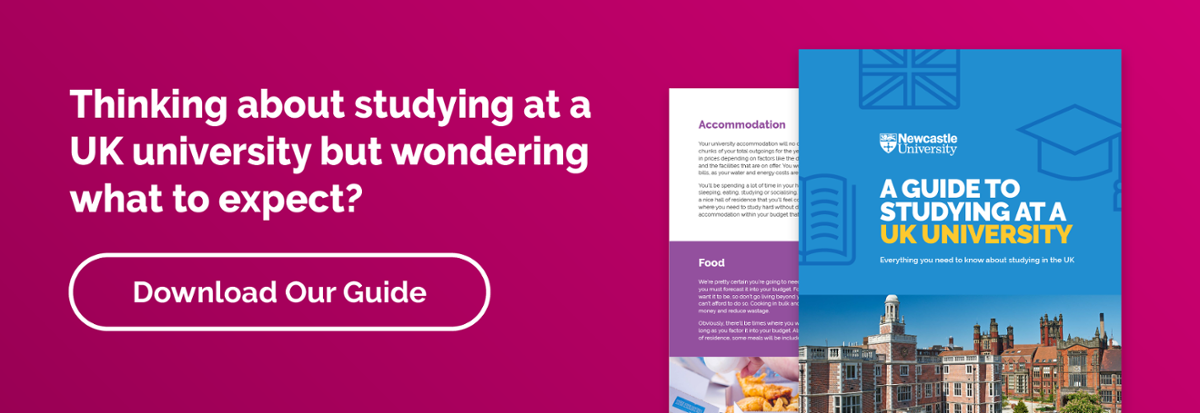Studying abroad and living in a new country is an exciting prospect but we understand that you might have a few questions that need answering. It’s perfectly normal to have some queries. After all, deciding to study abroad is a big decision that can greatly benefit you.
In this blog, we’ll answer any questions you might have and maybe some you didn’t think to consider.

- What are the entry requirements to study abroad?
- What visa do I need to study abroad?
- Am I entitled to student loans?
- What courses can international students study?
- How do I apply for accommodation?
- Will studying abroad help my future career?
- Can I work whilst I study abroad?
- How can I be safe when studying abroad?
- Will I feel homesick?
- Is it easy to make friends when studying abroad?
- How do I budget when studying abroad?
- Will I fit in with the diverse community?
1. What are the entry requirements to study abroad?
Entry requirements vary for each university and they accept equivalent grades from all over the world. It’s essential to check the information provided by your prospective university before submitting your application.
If you’re applying for an undergraduate degree, you’ll usually be asked for your predicted grades.
2. What visa do I need to study abroad?
There are a number of UK visas which permit study abroad, but the main student routes are Tier 4 and Short Term Study. Most students coming to the UK for courses of more than six months will apply for a Tier 4 General visa.
You'll need to make preparations to apply for your Tier 4 visa well in advance of your arrival in the UK. Be sure to take note of the conditions in your offer letter.
3. Am I entitled to student loans?
Student loans from the UK government aren’t available for international students. However, there are other ways to fund your study such as private funding and scholarships.
4. What courses can international students study?
Studying abroad in the UK gives you the opportunity to access world-leading research facilities and excellent teaching.
Each university will usually have its own prospectus where you can find out more about the courses they offer. Here at Newcastle, we're committed to delivering high-quality learning experiences. You can browse our international undergraduate guide for more information on what we offer to international students.
5. How do I apply for accommodation?
You will need to formally accept your academic offer and make a university a firm choice before the deadline. Every university will have a different deadline date, so it’s important to check on their site or get in contact.
At Newcastle University, we have a user-friendly online application portal where you can communicate your preferences for accommodation. If you’re an international student looking to study here, we can guarantee a room in one of our amazing accommodation sites for the duration of your study.
6. How can I be safe when studying abroad?
When you’re having fun exploring your new surroundings, it’s important to be safe. Besides being careful with money and having personal items insured, there are lots of other tips you can follow to keep yourself safe.
The Newcastle University campus is very safe, with security regularly patrolling the residences. Plus, there’s even a free app which connects you directly to their security team if you have any worries about anything.
7. Will I feel homesick?
Don’t worry, it’s very common for you to feel homesick for a little while when studying abroad. The first few weeks may feel overwhelming but there are all kinds of support and activities to participate in to help you settle in.
8. Is it easy to make friends at university?
Joining a club, society or the students’ union for international students can be the perfect opportunity to make friends. They are managed by students, for students and can open you up to new hobbies and interests.
If your accommodation is in halls of residence, you’ll soon make friends with the people in the shared communal space or kitchen. Everybody is in the same exciting situation and eager to build friendships.
9. Will studying abroad help my future career?
All of the skills you acquire when studying abroad will help you achieve your goals. Becoming an expert in another language, developing your confidence and increasing your independence are just some of the benefits that can assist your future career path.
10. Can I work whilst I study abroad?
Typically, on a Tier 4 visa, international students can work up to a maximum of 20 hours per week. Working alongside your studies can give you extra income for socialising with your new friends.
Just make sure you are aware of working restrictions. Universities like Newcastle have a dedicated visa team who can answer all your questions and queries.
11. How do I budget when studying abroad?
When managing money during your studies, keeping to a budget and being smart with your finances is vital. There are tips you can follow to make sure your priorities are covered like accommodation and textbooks and that you still have spare cash for recreational time.
You can do things like explore the city, dine out with roommates and even venture around the UK using the connected transport system.
12. Will I fit in with the different people at university?
University is filled with students from different cultures and unique backgrounds. Embracing your own culture and being yourself is the best way to fit in.
Now all your questions regarding studying abroad are answered, you can learn about the UK and its diverse community and lifestyle.
Answer any other questions about studying abroad with your all-in-one guide to the UK
We’ve answered your questions regarding accommodation, visas and fitting in. But they are just some of the things you need to think about before moving to the UK to study. We know you’re excited to get learning and settled in, but you do need to consider things like budgeting and the visa application process in detail.
To help, we’ve created an all-in-one guide to help answer any questions you have regarding studying at a UK university. To get your free copy, click on the link below.
